by JOHN WILLIAMS
Play for Today Writer: Jim Allen; Director: Kenneth Loach; Producer: Graeme McDonald
‘I go along with Trotsky, that life is beautiful, that the future generation cleanses all the oppression, violence and evil’
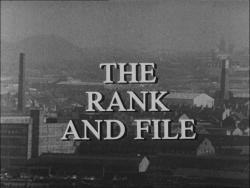
Most of Ken Loach’s work for television has attracted at least some critical writing because of his towering reputation in the cinema. Even so, The Rank and File has generally been overlooked in favour of the first Loach/Allen Wednesday Play collaboration The Big Flame (1969), and both writer and director seem to have mixed feelings about the piece. Allen stated that the play ‘was written in three weeks…if you get too didactic, politically or otherwise, as I probably did in The Rank and File, it can be a lantern lecture’,1 and Loach has commented that ‘the [films] we’ve done that show their age badly are the ones where you’re trying to catch the headlines and be topical…some of the films from the early seventies’.2 However Rank…, while superficially similar to The Big Flame, was written for specific reasons about a recent strike, rather than a (prophetic) vision of a political occupation. And Loach’s own reference to topicality should lead us consider that one of the strengths of the Play for Today strand lay in the ability, as in this case, to move with astonishing speed from a real-life event to a fictional representation in just under 11 months. The urgency of such a representation is not diminished just because the events that inspired Rank… have become obscure footnotes in twentieth century industrial relations, but I’d like to try and illuminate some of the historical background to the play, and also look at what it tells us about the role of politics, specifically Trotskyite politics, in the BBC Plays department at the time.
Rank… is closely based upon the Pilkington Glass strike that took place in St. Helens in 1970, although the BBC insisted that the firm be renamed Wilkinsons, and the action relocated to the Potteries. The family firm that dominated the town had traditionally been seen as a paternalistic employer (Allen’s script describes the Christmas bonus of a free bag of coal and a contribution towards the TV licence of every employee) and the board enjoyed a cosy relationship with the local executive of the General and Municipal Worker’s Union (GMWU). However the close relationship of board and union executive had meant that for many years the needs of the rank and file union members had been swept under the carpet in favour of mutual back-slapping, and resentment towards this state of affairs was building.
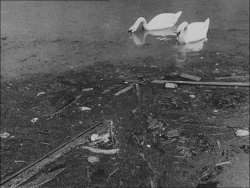
The catalyst for the strike action was a problem with ‘the cumbersome structure of different bonus and shift payments which meant that men doing similar jobs took home different and unpredictable pay packets’,3 and this rapidly grew into a ‘wild cat’ action and a general call for an extra half-crown an hour. Within two days all of the men were on strike, and ‘workers from all over St. Helens were ringing up the GMWU offices and asking: “Do you want us out in support?”. Needless to say, the officials didn’t’.4 The union were as much the target of the strikers’ anger as the Pilkington board. The GMWU was the most stalwart of Harold Wilson’s supporters during the various wage freezes, cuts and incomes policy that had propped up the government during the devaluation crisis of the previous two years, and there was a growing sense of disillusion among rank and file members towards unions that were fostering good relations with the government at the expense of their members. When Barbara Castle introduced the white paper ‘In Place of Strife’ it became clear that unions would be more formally obliged to support the government, and that certain types of action would become illegal. At this point it became impossible for unions to claim that they could support both the government and their members, and many of the more left-leaning unions turned on the government and were supported in turn by the left wing of the Labour party. Although ‘In Place of Strife’ did not pass through the House of Commons, the newly elected Tory government introduced the Industrial Relations Bill which would be passed in 1971 and was even tougher on unofficial strike action. It is against this background that many union members formed their own Rank and File Strike Committees (RFSC), and Trotskyite groups such as the Workers’ Revolutionary Party (WRP) (previously the Socialist Labour League (SLL)) attempted to make forays into certain strike actions.
The genesis of Rank… was a visit Jim Allen made to Pilkingtons Glass Works during the 1970 strike. Although Allen had left the SLL (for unexplained reasons) shortly after being expelled from the Labour Party in 1962, he had maintained a supportive relationship with the group and had agreed to visit Pilkington’s to help boost the strike and show the men The Big Flame. After this, one worker asked if Allen would make a film about their struggle, and when Allen pleaded pressure of other work:
This old fella said ‘come to the toilet with me, I’ll show you my war medals. We got to the toilet and he whips his shirt off, and his back was lacerated, as if he’d been whipped by glass, and then he put his shirt back on. He said, ‘I’ve worked here all my life, never been on strike and I’ve been told that unless I scab, they’ll take my pension away.’ Anyway this fella refused to scab, and he finished up with no pension and he was sweeping up in a Co-op shop in St. Helens. Well, that was moral blackmail. So, I said, ‘yes, of course, I’ll write a script’.5
The fact that The Big Flame was such a direct cause of Rank… being written is just one of the things that link the plays so closely. A number of the cast members reappear in the later play, and Peter Kerrigan and Neville Smith both play members of the respective RFSC in each production. Both plays feature powerful performances from men who were close to the workers and working life that they portrayed, and in Rank… this is particularly evident in the scenes where Eddie (Peter Kerrigan) is intimidated after the strike by being followed by managers, and the scene quoted by Allen where Charlie (Charlie Barlow) has his pension rights withdrawn. But however closely the plays are linked on the surface they have some important differences, and this is largely in their use of political theory.
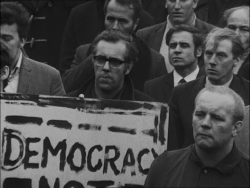
The Big Flame has been described by Loach as ‘Jim’s definitive script…it should have been a film of epic proportions with a cast of thousands constantly on the move, but we didn’t have the resources to make a film on that scale’.6 On the surface it describes a similar industrial action that occurs in Rank…, in this case a group of rank and file workers on the Liverpool docks go out on strike in defiance of their union, mainly as a response to the Devlin report which recommended casualization of the workforce. The scenes which follow, of strikers discussing the progress of the strike with fellow workers, and with unspecified narrators describing certain aspects of the strike are very similar to the bulk of Rank…. But The Big Flame takes a different course when it introduces the character of Regan, a former docker who recommends that the RFSC go beyond the economic basis of the strike, and politicise it by occupying the docks and allowing the workers to run them. Inevitably, the occupation is eventually broken, but the leaders are martyred with hefty prison sentences, and the whole event ends having attained an almost mythical status. The two plays differ most significantly because of this explicit integration of Trotskyite politics into the imagined strike in The Big Flame, and this is largely due to the fact that Rank… is based explicitly on the Pilkington strike of a year before, and is therefore more of a matter of record than invention, despite Loach’s attempt to universalise it.
The Pilkington strike was called by an RFSC comprised of men very like those described in The Big Flame:
If you are a strike leader, then to get the respect of the men, you’ve got to graft, because you only regain the respect of the men if you’re good at your job and then they’ll listen to you…the strike is the last resort and anybody who says he can fetch workers out at the drop of a hat doesn’t know what he’s talking about.7
Despite what was said by much of the media at the time, the Pilkington RFSC was not infiltrated by any Trotskyite groups:
Representatives of the various left-wing groups – mainly from the Socialist Labour League and the International Socialists – were naturally around, and we spent many an intriguing evening watching them trying to approach RFSC members…responses ranged from polite attention and a laugh afterwards to a blunt ‘piss off’.8
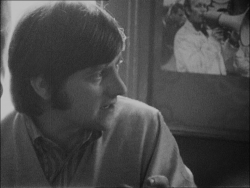
This reality is reflected in Rank… which unlike The Big Flame does not have any characters that theorise about, or politicise the strike in Trotskyite terms. And this is largely because the play was created by Allen to draw attention to the new government legislation which would make wildcat, unofficial strikes illegal, and also to hammer home how appallingly the men were treated once the strike was off the front page of the newspapers. And on these terms the play is greatly successful, and Loach himself, though regarding the script as inferior to The Big Flame, thought it was much more urgently directed. But this is somewhat undermined by the end of the play, which introduces the quotation from Trotsky which forms the epigram to this article. Despite the fact that this is one of Trotsky’s less politically loaded comments taken from his last testament, it seems clumsily inserted, as if Allen and Loach needed to add a wider, revolutionary aspect to the play. This is unfortunate, as up to that point it had quite successfully managed to portray the Pilkingtons RFSC, as the group of experienced workers that they actually were, as opposed to the shipped-in Trotskyites the media accused them of being.
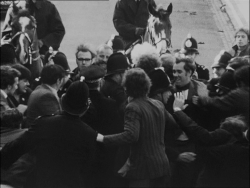
It is no surprise that the Trotskyite elements in the work of Allen and Loach (and a number of others) should have come under attack from most of the right-wing media at this time. But attacks from the anti-Trotskyite left were equally vitriolic. Their general accusation is that Loach’s work invariably toes the classic Trotsky line of the ‘revolution betrayed’, and takes an unnecessarily ‘workerist’ view. Critics have argued that the sustained attack by Loach and Allen upon official union leaders was a nonsense, and that rather than workers being defeated by the coming of the Industrial Relations Act, they in fact became more militant, and in conjunction with the trade union leaders brought down the Heath government in 1974. Some have even gone as far to accuse Loach and Allen of being stooges:
Is it merely coincidence that these series of films, which attacked the trades unions as being bureaucratic and dominated by Stalinists, was put out by the BBC during a time when the labour movement was under attack?9
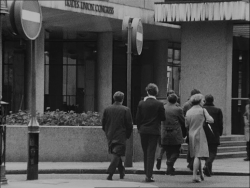
Although this is a somewhat simplistic (and indeed paranoid) view of both The Big Flame, and Rank… it is true that many of the creative talents in the Plays department at the time were specifically Trotskyite, and did not necessary represent a broader range of left-wing positions. As I’ve mentioned already, Allen had cut his formal links with the WRP but still ‘continued a supporting relationship with the party for some years after’,10 and it is certainly the case that Loach and Garnett were heavily influenced by ‘Jim Allen, in particular, who introduced us to the serious left’. The WRP and others worked so closely with Loach that he was even given reading lists and told ‘this week you’re going to read that book and you are going to talk about it on Friday and we don’t care if you’re in the studio on Thursday night, you’ll be there and you’ll talk about it’.11 This is a fascinating insight into a time where an individual’s political consciousness was being forged at the same time as they would be creating new work in the recently opened television centre. Although the WRP had only a brief moment in the political ascendancy, it can also be seen to have had a disproportionate influence on BBC drama production,12 and is critical to understanding why playwrights and directors thought their work should and could have an impact on the existing political structures.
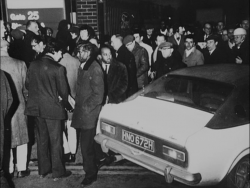
The production of Rank… is a significant indication of the influence, and in turn, the possible political uses of a television play at the time. In the changed political environment that we have inhabited since the 1984 miners’ strike and the general demonising of so-called ‘hard left’ political groups and ‘political’ strikes, it is hard to imagine a television playwright taking his work on the road to rally support for rank and file industrial disputes. It is even harder to imagine that the same strikers could suggest a subject for such a significant strand as Play for Today, and see the results in less than a year. This state of affairs would not last, and only a few years later the unions would be more likely to see their struggles represented by agitprop theatre groups such as John McGrath’s 7:84, rather than in a peak-time prestigious slot. The reasons why such things were possible in the late 1960s and early 1970s, were primarily due to the political affiliations of a number of important members of the BBC Plays department, and these affiliations engendered not only controversial political debates, but also resulted in some of the key artistic debates concerning naturalism and ‘non-naturalism’ that continued to rage even up to the present day. Rank… demonstrates both the strengths and weaknesses of a politically committed approach to art, and gives the lie to the notion that such work cannot have an impact today, even in our politically neutered environment.
The Rank and File was released on DVD in 2011 within the BBC/2Entertain release Ken Loach at the BBC. It is now available online.
Originally posted: 1 July 2003 on the old Mausoleum Club version of this site.
Updates:
2006: transferred to the old University of Hull version of this site.
2009: transferred to new Play for Today mini-site initially separate from the British Television Drama site
4 November 2010: first appearance of this essay on the main British Television Drama site, moved from a different URL, as all the pieces from the old mini-site were transferred to the main site.
5 February 2017: added images; added link to Loach DVD set; minor typographical corrections mostly involving the placement of punctuation around endnote markers.
4 March 2017: standardised presentation of ‘Updates’ legacy information (2003, 2006, 2009) in line with current site practice; removed ‘(first published: 2003)’ from byline as a result.

Pingback: Women and Work: Leeds United! (1974) Part 2 of 3 – British Television Drama